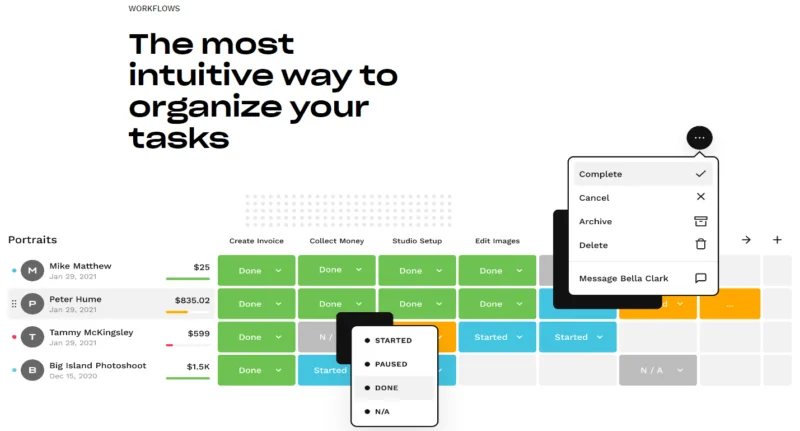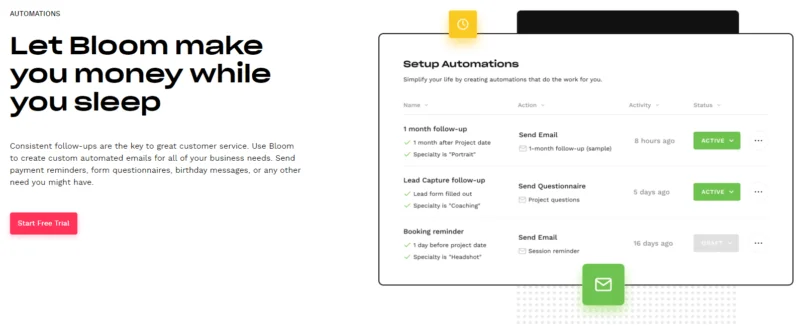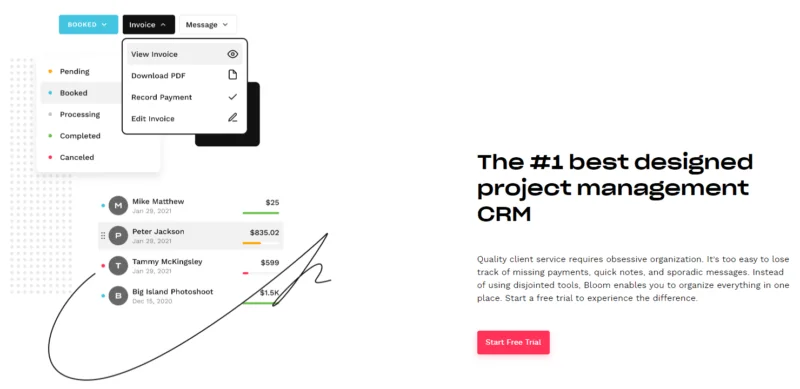A recent survey revealed that over 60% of freelancers wish to access a CRM system to better manage client interactions and grow their businesses. Even freelancers and startups on a tight budget require effective customer relationship management (CRM) tools. However, the high cost of many options leaves some searching for more affordable or “cheapest CRM” solutions. If this is you, don’t think that looking for more affordable CRM options will leave you without a functional CRM.
The increasing variety of CRM options now caters more closely to the needs of home-based solopreneurs, freelancers, and small-scale startups. These solutions are designed with the realities of limited resources in mind, offering the essential features of high-end systems without the daunting price tag.
By focusing on the core functionalities and streamlining the user experience, tools like Bloom.io are breaking down the barriers, making CRM accessible and affordable. This guide will navigate you through the maze of options to find CRM solutions that provide exceptional value for money, aligning with the budget constraints and growth aspirations of modern freelancers and emerging businesses.
What is an Affordable CRM?
The cheapest CRMs (Customer Relationship Management) are tools designed to manage a company’s interactions with current and potential customers in a cost-effective manner.
They’re tailored for businesses, especially small to medium-sized enterprises (SMEs), startups, and freelancers, who require the functionalities of a CRM without the hefty investment typically associated with larger, more complex systems. Here’s what makes a CRM affordable:
- Cost Structure: Affordable CRMs often have a lower price point. They may offer flexible pricing plans, including freemium models, where basic services are free, and more advanced features come at a cost. This allows businesses to scale their use of the CRM as they grow.
- Essential Features: While they may not include all the advanced features of high-end CRM systems, affordable CRMs cover essential functionalities like contact management, task tracking, lead management, email integration, and basic analytics. These features are sufficient for managing customer relationships effectively without overwhelming users.
- Ease of Use: These systems are usually more user-friendly, with simpler interfaces and easier setup processes. This is particularly beneficial for smaller teams without dedicated IT support.
- Scalability: Many of the cheapest CRMs are designed to grow with your business. They offer the flexibility to add more features, users, or enhanced capabilities as your business needs evolve.
- Minimal Training Required: Due to their simplicity and intuitive design, affordable CRMs often require less training, making them more accessible to teams without prior CRM experience.
- Cloud-Based: Many affordable CRM solutions are cloud-based, offering remote access and eliminating the need for in-house server maintenance.
Must-Have CRM Features on Entry-Level Budgets
When considering the cheapest CRM solutions for businesses operating on entry-level budgets, it’s important to focus on essential features for day-to-day operations.
These typically include the ability to handle cross-channel customer communications, create personalized sales quotations, and make basic pipeline forecast projections. While evaluating CRMs, ensuring these key features are included in even the most basic packages is crucial.
The goal is to extract maximum value from a CRM solution without stretching limited financial resources. Businesses should be cautious of free CRM options that might not support growth or adapt to changing needs, as this can lead to long-term inefficiencies and additional costs.
Core Contact Management Capabilities
The backbone of any CRM system, especially for small and budget-conscious businesses, is robust contact management. This includes:
- Centralized Customer Database: A unified database that links all communication history to individual customer profiles. This feature is vital for maintaining a comprehensive and easily accessible record of customer interactions.
- Email Correspondence Tracking: The ability to track and assign email correspondences, ensuring that all customer communication is logged and monitored.
- Multi-Channel Communication: Integration of various communication channels, like SMS, into the CRM. This allows for a seamless continuation of customer interactions across different platforms.
- Customizable Assignment and Routing Workflows: The ability to customize workflows for routing and assignment based on common scenarios faced by the business. This customization helps in streamlining operations and improving response times.

Must-Have Sales Automation
For businesses looking to maximize efficiency within a limited budget, sales automation is a key feature:
- Pipeline Tracking: Ability to track the different phases of the sales pipeline, from initial lead status to the closing of deals. This helps in effectively managing the sales process and identifying bottlenecks.
- Sales Performance Dashboards and Predictive Analysis: Dashboards that provide an overview of sales performance, coupled with predictive analysis, can offer valuable insights into future sales trends.
- Template Creation for Proposals, Contracts, and Invoices: The CRM should allow for the creation and customization of templates for proposals, contracts, and invoices, streamlining the sales documentation process.
- Task Management: Effective management of tasks to prevent any gaps in follow-ups with prospects or customers.

Conducting purposeful evaluations of CRM tools, focusing on immediate workflow needs, can reveal solutions that deliver significant impact even with limited expenditure. Bloom.io, for instance, is a CRM that aligns well with these requirements, offering robust features tailored for businesses mindful of their spending.
Vendor Solutions Balancing Investment & Sophistication
The CRM marketplace is evolving rapidly, offering solutions that balance robust functionality with modest investment. When evaluating cheapest CRM options, businesses should focus on three key areas to ensure they’re making a smart investment:
Interface Design Optimizing Adoption
The usability of a CRM is critical. Even the most affordable solution can fail to provide a return on investment if it’s not user-friendly. Simple, intuitive navigation is essential for quick adoption and immediate value realization. A complex interface can deter users, reducing the overall effectiveness of the CRM.

Support & Community Augmentation
The availability and quality of support and community resources are vital. Limited access to help and troubleshooting can create significant operational bottlenecks. Assessing the level of support offered, including knowledge bases, community forums, and customer service, provides insight into the post-purchase experience and ongoing assistance you can expect.
Current & Future Scalability Elements
The ability of a CRM to grow with your business is crucial. Platforms that maintain relevance through different phases of business growth offer better long-term value. It’s important to consider not just current needs but also future requirements when selecting a cheap or affordable CRM.
Cross-evaluating CRMs against these criteria helps find the best balance between cost and functionality.
Bloom.io & Other Notable Budget-Conscious CRMs
Bloom.io
- Offers a 14-day free trial and budget-friendly pricing at $19/month per user.
- Scales from freelancers to small teams.
- Key features include VoIP integration, Gmail sync, activity tracking, pipeline management, customizable templates, and mobile optimization.
- Ideal for businesses seeking efficient sales communication and visibility at an affordable price.
- High adoption rates are achieved through intuitive, unified interfaces, offering more functionality per dollar.
Zoho CRM
- Provides a range of features, from free to $12/month tiers.
- Enhances contact history visibility and continuity.
- A broad marketplace for extensive customization over time.
Really Simple Systems
- Affordable Pro plan starting from $22/month.
- Features include Outlook synchronization and comprehensive reporting tools.
- Assists in team transparency and efficiency in quoting processes.
Freshworks CRM
- A 21-day free trial of a feature-rich platform.
- Known for its intuitive interface and quick user adoption.
- Offers enterprise-grade solutions at SMB-friendly pricing.
Maximize Value Beyond Lowest Cost Options
While the cheapest CRM market offers a range of options suitable for limited budgets and early-stage businesses, the cheapest options can sometimes lead to limitations, especially when scaling over time. It’s important to look beyond just the upfront cost and consider the long-term value and scalability of the CRM. A slightly higher investment in a more suitable platform can yield better returns in the long run, as opposed to opting for the cheapest option that might require costly upgrades or replacements as business needs grow.
Key Decision Guidelines for Choosing the Right CRM
User Experience
It’s essential to choose a CRM that matches the skill level of your team. A system that’s too complex can slow down adoption and integration into daily workflows. Look for a CRM that’s easy to use and fits seamlessly into your existing processes. Bloom.io is an example of a CRM that balances these factors well, offering an intuitive user experience without disrupting your current environment.
Start-Up Friendly
For startups, it’s important to avoid CRMs that require extensive training or long setup times. Your CRM should be easy to implement and use right away. The goal is to get up and running quickly, with a system that doesn’t demand a lot of time or resources to start showing value.
Growth-Focused
Choose a CRM that can grow with your business. Even if you’re starting small, you need a system that remains relevant as your business evolves. This means finding a CRM that can handle more sophisticated processes in the future without needing a complete system overhaul.
In summary, selecting a CRM that aligns well with your business’s current and future needs is key to maximizing your technology investment. Look for a solution that is easy to adopt, start-up friendly, and capable of growing with your business. This approach helps minimize the risk of selecting a system that doesn’t perform as needed or becomes obsolete too quickly.
Smart Cost Management with Effective CRM Practices
If you’re a solo entrepreneur or freelancer wondering how switching from manual contact tracking to a CRM might boost your leads, or if you have a small team and are unsure about the cost-benefit of using a CRM, there’s a straightforward solution. Many CRM providers offer low-risk ways to try their services before making a financial commitment.
You can take advantage of free trials from vendors like Zoho, Insightly, and Bloom.io. These trials let you integrate the CRM into your current workflow without major disruptions, giving you a real sense of how it works for your business before you decide to pay for it.
It’s also wise to use the resources that these providers offer, such as knowledge bases and community forums. These can teach you the best ways to set up and use the cheapest CRM for your specific needs, helping you avoid common mistakes that might put you off during the early stages of using a new system.
Moving your customer data from simple spreadsheets to a more sophisticated CRM can greatly enhance your sales efficiency and customer insights. However, it’s important to see clear evidence of these benefits before fully committing. By starting with a low-cost approach and focusing on the performance improvements a CRM can bring, you can make a more informed decision about the value it offers in relation to its cost.
Even the Cheapest CRM Solutions Aid Customer Continuity
Manual record-keeping is a viable option only until your business grows to a point where the volume of contacts and complexity of sales processes become too much to handle effectively. Switching to an affordable CRM solution, which centralizes and streamlines information management, helps growing startups avoid the pitfalls of disjointed customer experiences as they scale.
When choosing a “cheapest CRM,” it’s important to consider more than just the cost. Solutions like Bloom.io offer features that support continuous customer relationship management and allow sales teams to develop gradually, without the need for disruptive upgrades soon after implementation. Other CRM providers might require a more extended evaluation period to find the right fit.
In today’s market, the range of available cheapest CRM solutions has made it easier for resource-limited entrepreneurs to adopt sales automation technologies. By choosing a CRM system that is easy to adopt and aligns with your strategic needs and your team’s capabilities, you can invest wisely in technology that grows in value over time and supports your business’s progress.
Take Action:
Are you ready to streamline your customer management and boost your sales efficiency? Give Bloom.io a try. With its user-friendly interface and comprehensive features tailored for growing businesses, Bloom.io is the smart choice for freelancers looking to scale efficiently. Start your journey today with a free trial and experience the difference a tailored CRM solution can make in your business growth.